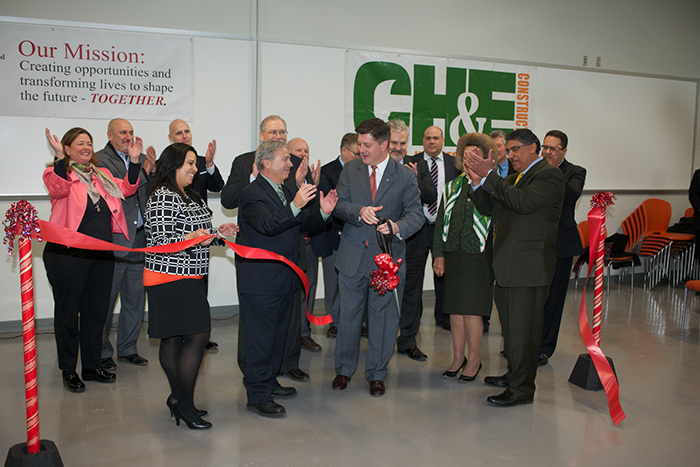Success Story: Workforce Training is Not One Size Fits All
September 2014 Newsletter

Ensuring employers have a well-trained workforce with the skills employers need is key to economic growth. But it’s impossible to learn a skill if you don’t understand the instruction being given or if there are cultural barriers to the training. Culturally appropriate workforce training is crucial to ensuring a properly trained workforce in many parts of the country, and EDA has supported projects to provide that training in areas ranging from Pennsylvania to California.
In 2011, EDA announced a $1.3 million grant in Lancaster, PA to the Spanish American Civic Association (SACA) and the SACA Development Corporation of Lancaster to help renovate a vacant facility for use as the state-of-the-art Bilingual Technology Training Center. The center would extend bilingual and remedial training opportunities to prepare low-income minority clients for high-demand growth jobs in the Lancaster region
Today, Tec Centro is the only bilingual technology center in Pennsylvania. It operates in collaboration with the Lancaster Workforce Investment Board, the Harrisburg Area Community College, area employers, corporations, the faith based community, and community & corporate foundations
Since Tec Centro formally opened in February 2014, it has admitted 100 neighborhood residents into English as a Second Language and Adult Basic Education courses and has a wait list with more than 100 individuals who also want training services. Recently, Tec Centro offered its first Certified Nursing Assistant Training to 10 individuals, and all graduates were placed in full time employment.
“It is our intent to provide services to 300 unemployed and underemployed residents of the community in a year’s time,” said Carlos Graupera, President of the Spanish American Civic Association. “Given our initial rush of clients, we can clearly see that we will meet and exceed that goal.”
By September 2014, Tec Centro will have all core training areas in operation, including:
- Culinary Arts/Hospitality Training
- Allied Health Training
- Financial Industry Training
- Dental Assistant Training
- Construction Trades/Building Maintenance Training
EDA has made similar investments in other EDA regions as well. In 2007, EDA gave a grant of $1.5 million to the Albuquerque Hispano Chamber of Commerce foundation to construct a new building with additional classroom space for business development and job training programs on the campus of the Barelas Job Opportunity Center of the Albuquerque Hispano Chamber of Commerce. The facility provides a complete array of educational services and programs designed to improve the educational opportunities and experience of Hispanic and community members in order to create a job ready and well trained employee base for both small and large companies in the Albuquerque metropolitan area. The BEOC also offers working partnerships with many resources and partners such as the Small Business Administration, the New Mexico Department of Labor, Qwest, the Workforce Connection of Central New Mexico, the National Council of La Raza, Comcast, and Youth Development, Inc. Designed to address the training, employment and entrepreneurial needs of the business community, the BEOC affords the AHCC member an invaluable roster of resources and services.
In 2009, EDA gave the Fresno Area Hispanic Foundation $1.7 million to create the “Downtown Business Hub.” The project help grow businesses in the economically distressed areas of Fresno, as well as other economically distressed communities in the County of Fresno. The incubator focuses on companies in target industries such as Internet web design, graphic design and custom manufacturing and provides start-ups with a range of entrepreneurial and financial assistance, such as microloans, and training in readiness business management, business plan development, and licensing and regulatory requirements. FAHF anticipates that the incubator will create 900 new jobs and generate $36 million in private investment nine years after renovation completion.
Just as it is crucial to ensure that workers are trained with skills employers need, it is also crucial to ensure that the needs of the people being trained are met. There is not a one-size-fits-all workforce development curriculum. These EDA grantees understand the needs of their communities and are working to meet them.


